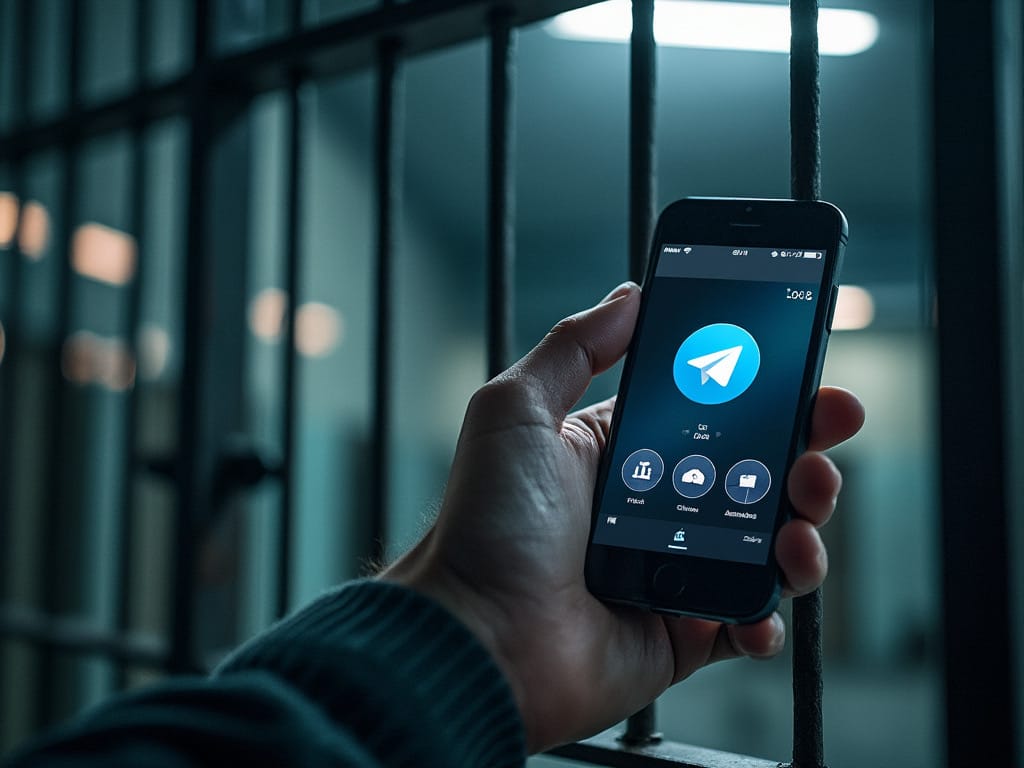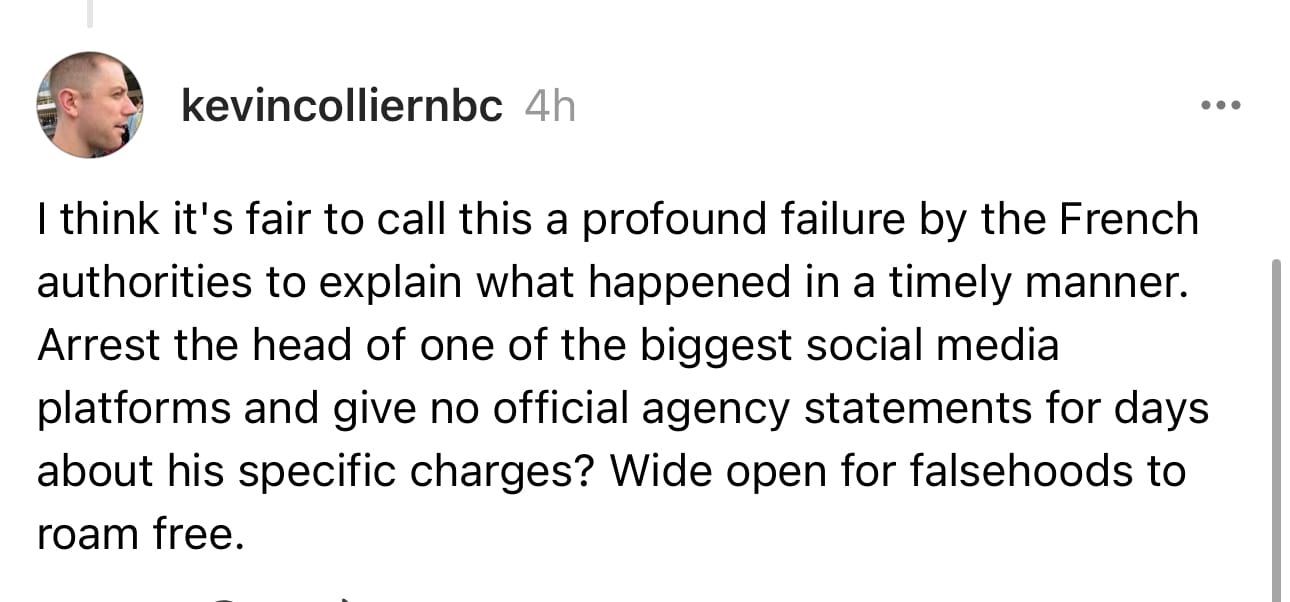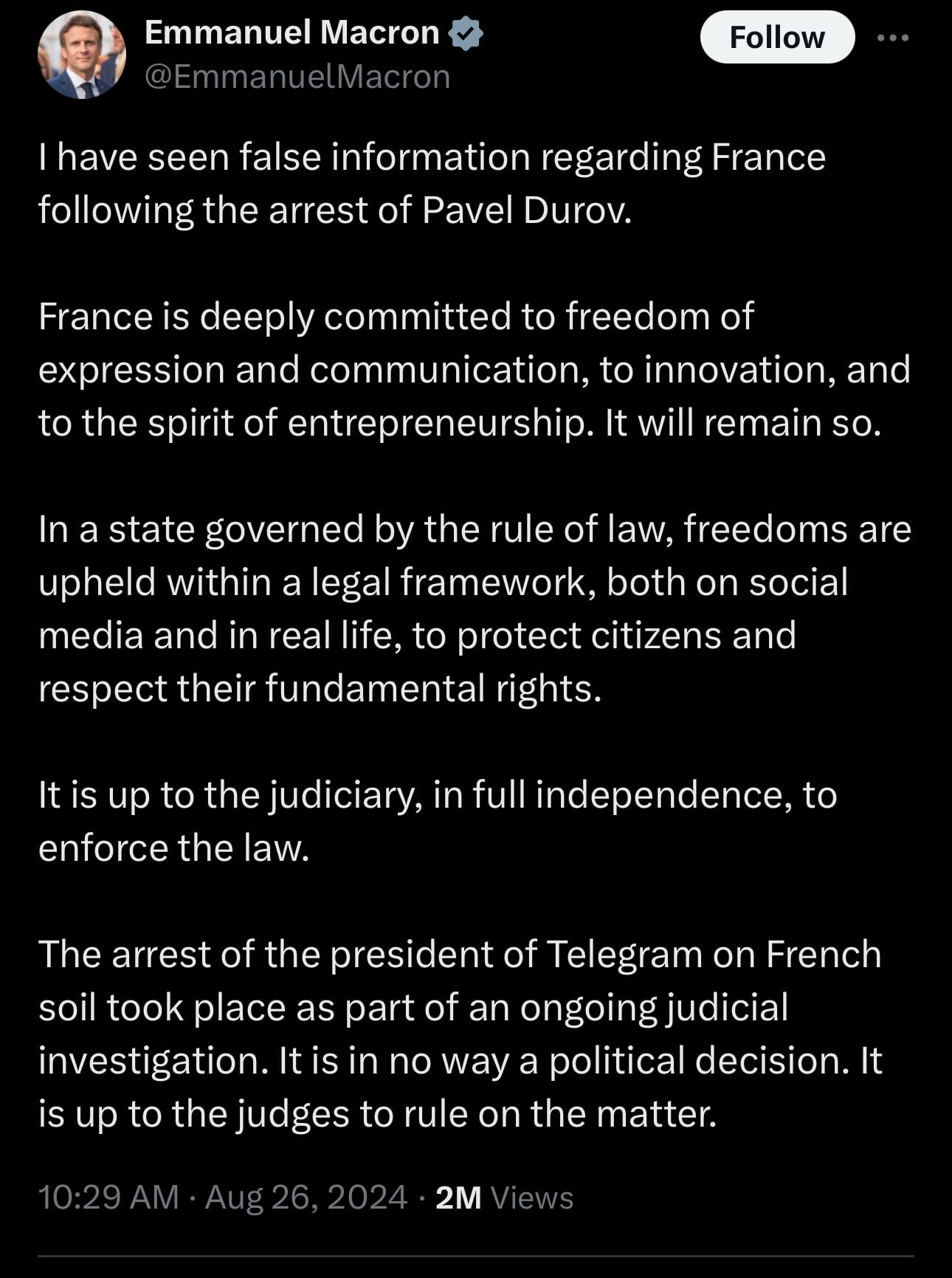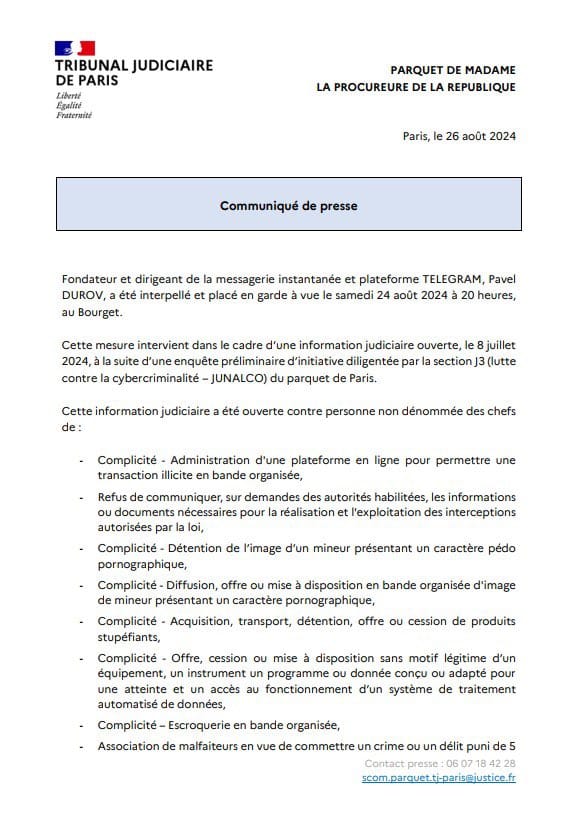What the arrest of the Telegram CEO tells us about the future of online platforms

Good afternoon from Capitol Hill, where I’m listening to the cicadas buzz and enjoying see kids go back to school. Alex here, with another civic text. Many thanks to everyone who signed up over the weekend, particularly the paid subscribers whose support is crucial for making this work sustainable. Please keep share these newsletters with your networks and communities if you find them valuable.
Today, I want to spend some time focusing on what the arrest of Telegram CEO by Pavel Durov by French authorities means.
If you missed the news about France arresting a Russian-born tech billionaire who operates a global messaging platform, I recommend reading Reuters, not the speculation and outrage on social media.
Unfortunately, as NBC reporter Kevin Colliee highlighted, France created an information void by not disclosing the cause of Durov’s arrest in a public indictment and confirming them in a press conference, leaving it unclear why its police forces took this extraordinary step, thus allowing speculation to flood in.

It’s striking that a modern democracy is still getting this so wrong in 2024, much less in a high-profile arrest offfiials had to know would draw global attention and competing propaganda campaigns from state and non-state actors.
Yesterday, France24 reported that France's office for the protection of minors had issued an arrest warrant for Durov in a preliminary investigation into “fraud, drug trafficking, cyberbullying, organised crime and promotion of terrorism.” Al Jazeera cited a police source who confirmed these crimes were relevant.
As the Washington Post reported, Jean-Michel Bernigaud, head of the L’Office Mineurs, finally posted about the matter on LinkedIn this morning, stating that ”the heart of this issue is the lack of moderation and cooperation of the platform (which has nearly 1 billion users), particularly in the fight against paedophilia,” and encouraged people to watch a documentary about ”pedocriminals” on Instagram.

In an (overdue!) public statement posted to the platform formerly known as Twitter today, President Emmanuel Macron denied the arrest was political, after acknowledging that “false information“ was spreading after the government he leads failed to provide it in timely way.
In the tweet, Macron claimed that France is “deeply committed to freedom of expression and communication,” and noted that "in a stare governed by the rule of law, freedoms are upheld within a legal framework, both on social media and in real life, to protect citizens and respect their fundamental rights.”

To be blunt, it‘s obtuse to state that police arrested a CEO because of actions or inactions on a social media or messaging platform they created and operate — and to simultaneously claim what happens online isn’t part of “real life.” Governments everywhere need to end the digital dualism.
What appears to be at issue is just the opposite. Governments have begun responding more forcefully to online activity around the world in recent years, often in ways that curb freedom of expression or outright quash all speech and dissent in Internet shutdowns.
What can be lost in the furor over such actions is that beyond the “lawful but awful” speech protected by the First Amendment in the United States exists the ugliest, darkest categories of content on Earth: terrorist burnings and beheadings, animal torture, child sexual abuse material (CSAM), rape videos, and so on.
As of today, it appears that Durov was arrested because he refused to cooperate with government requests or orders to remove CSAM content — not to take down lawful speech.
More significantly, Durov continued to operate a global social network without putting into place the human capacity required to moderate CSAM.
As NBC News reported today, Telegram “remains one of the most unmoderated apps on the Internet, and is a popular place for extremists, terrorists and scammers.”
Over on Threads, Meta staff like product manager Edward Dowling emphasized this angle, including the intentional, ongoing investment in systems and human capacity to mitigate CSAM.

As I was writing this newsletter, the French government finally put out a press release detailing the allegations, which I’ve added below, followed by a translation from Google for folks who do not “parlez Français.”

Founder and director of instant messaging and TELEGRAM platform, Pavel DUROV, was arrested and placed in police custody on Saturday August 24, 2024 at 8 p.m., at Le Bourget.
This measure comes as part of a judicial investigation opened on July 8, 2024, following a preliminary initiative investigation carried out by section J3 (fight against cybercrime - JUNALCO) of the Paris public prosecutor's office.
This judicial investigation was opened against unnamed persons of the heads of:
-Complicity: Administration of an online platform to enable an illicit transaction by an organized group, refusal to communicate, upon requests from authorized authorities, the information or documents necessary for carrying out and exploiting interceptions authorized by law,
Complicity: Possession of the image of a minor of a child pornographic nature,
Complicity: Dissemination, offering or making available in an organized group of images of minors of a pornographic nature,
Complicity: Acquisition, transport, possession, offer or transfer of narcotics,
Complicity: Offer, transfer or making available without legitimate reason of equipment, an instrument, a program or data designed or adapted for an attack and access to the operation of an automated data processing system,
Complicity: Organized gang fraud, Association of criminals with a view to committing a crime or an offense punishable by 5 at least years of imprisonment, Laundering of crimes or offenses by organized gang,
-Provision of cryptology services aimed at ensuring confidentiality functions without compliant declaration,
-Provision of a means of cryptology not exclusively ensuring authentication or integrity control functions without prior declaration,
-Importation of a means of cryptology not exclusively ensuring authentication or integrity control functions without prior declaration.
The investigating magistrates responsible for this judicial information jointly contacted the center for the fight against digital crime (CN) and the national anti-fraud office (ONAF) of the continuation of the investigations.
It is within this procedural framework that Pavel DUROV is interviewed by the investigators.
This police custody measure was extended on August 25, 2024 by an investigating judge and can last up to 96 hours (i.e. until August 28, 2024) taking into account the procedure applicable to offenses falling under the organized crime regime, referred to above.
Laure BECCUAU,
Public Prosecutor
As a former regulatory compliance reporter, this feels like a direct parallel to a bank that knows terrorists and cartels are laundering money after financial regulators inform them, or even letters from law enforcement that order the accounts to be frozen.
If that’s what’s going on here, as the judicial document lays out, then this is not a parallel to governments demanding social media platforms taking down investigative journalism or accounts from human rights advocates.
It is not an illiberal regime threatening to imprison a tech CEO if they don’t compromise encryption and build in backdoors to private messaging — as the FBI has done for years here in the U.S.A.
It’s not a global threat to freedom of expression, but rather a threat to the executives of tech companies who behave with impunity when a platform they build and operate is abused by organized criminals or corrupt politicians.
Those sorts of threats to speech are growing around the world, from Iran to India, where an increasingly authoritarian government has set a standard for global censorship.
In Vietnam, Meta has made repeated concessions to the government, “routinely censoring dissent & allowing those seen as threats by the government to be forced off.”
Before Elon Musk bought it and laid off trust and safety staff, Twitter fought government censorship in the Indian courts and beyond, going to court to protest gag orders and national security letters from the U.S. Department of Justice.
Now, X consistently bends to official demands & takes down posts critical of Prime Minister Narendra Modi and the accounts of journalists and the political opponents of the Hindu nationalists in power.
Musk has been volubly defending Durov since his arrest as an attack on freedom of expression. Doing so is part of a pattern and practice of him selectively defending the content and accounts of the global far-right in Brazil and Turkey and the United States, while demonizing journalists and falsely deriding liberals like Vice President Harris as Communists.
I was entertained to find that Grok, Musk’s AI bot, explained that the absence of a strong socialist or Communist tradition in mainstream politics means that the ’left‘ in the U.S. is often defined by what would be considered centrist or center-left in Europe“ — but that’s a subject for another newsletter.
What Durov’s arrest means is not that Internet freedom is under attack, that European democracies have slid into Communism or fascism without warning, or that a tech CEO was targeted for prosecution because of his ideological leanings.
I’m troubled by the items on cryptography and what they might presage for the operators of platforms with strong, end-to-end encryption like Signal, as past of a much broader effort by governments to surveil all personal papers on the planet.
This is not the “end of global social media,” but it may be the beginning of the end of impunity for tech billionaires who behave as if they are beyond the reach of accountability for the harms that their unregulated platforms cause offline.
In that sense, Durov’s arrest is a canary in the troll mine. It seems that France investigated the prevalence of CSAM on Telegram, confronted the CEO who operates it, and then arrested him when he refused to take illegal content down and cooperate with authorities.
More facts may emerge through the judicial process that will flesh out what we know or don’t know, complicating this analysis, but that’s my conclusion for today.
As always, thank you for subscribing. you can write to me with questions, comments, tips, or other feedback at alex@governing.digital, where I can provide a Signal number for secure communication.



